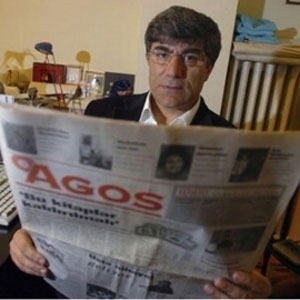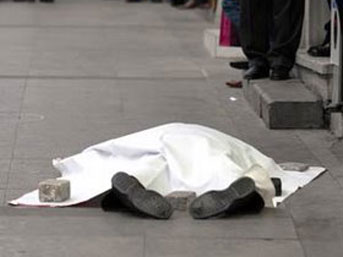 ISTANBUL |19-01-2014 | Hrant Dink (September 15, 1954 – January 19, 2007) was born in Malatya. Dink was best known for his role as editor of ‘Agos’ Turkish and Armenian Language weekly in Istanbul. He worked as the columnist and editor-in chief of AGOS weekly newspaper, which can be regarded as the voice of Armenian community, from 1996 until January 19, 2007 when he was shot dead outside of his office.
ISTANBUL |19-01-2014 | Hrant Dink (September 15, 1954 – January 19, 2007) was born in Malatya. Dink was best known for his role as editor of ‘Agos’ Turkish and Armenian Language weekly in Istanbul. He worked as the columnist and editor-in chief of AGOS weekly newspaper, which can be regarded as the voice of Armenian community, from 1996 until January 19, 2007 when he was shot dead outside of his office.
At the age of seven, he migrated to İstanbul together with his family. In Istanbul, his parents got divorced and he was raised by the Armenian Orphanage in Gedikpasa, Istanbul with his 2 siblings.
He got his primary and secondary education in Armenian schools. Immediately after secondary school, he got married to Rakel, a childhood friend from the orphanage. Hrant finished the Istanbul University’s Science Faculty with a degree in zoology. Hrant served 8 months with the Turkish Naval Infantry Regiment in Denizli to satisfy his mandatory military service. He had three children with his wife.
He graduated from Zoology Department of İstanbul University’s Science Faculty. Then he continued his education at Philosophy Department of the same university’s Literature Faculty for a while.
He started to publish the Turkish-Armenian weekly newspaper AGOS on April 5, 1996 to establish a bridge of communication and understanding between the larger Turkish population and the Turkish-Armenian community which he complained was living too isolated an existence. He tried to make AGOS newspaper a democrat and oppositional voice of Turkey and also to share the injustices done to Armenian community with public opinion.
One of the major aims of the newspaper is to contribute to dialogue between Turkish and Armenian nations and also between Turkey and Armenia.
He took part in various democratic platforms and civil society organizations.
He was charged and convicted of insulting Turkishness in Turkey, charges which he denied.
After his high profile trial, he was targeted by Turkish nationalists and murdered by gunshot to the head as he left his office. His son Arat now runs Agos and is now on trial for insulting Turkishness.
It was an assassination that left an extraordinary mark on the Turkish judiciary, justice and public conscience. So did the tragedy it symbolized. With the case of Hrant Dink returned to ground zero six years after the murder, the victim’s family lost its patience in an open letter.
Hrant Dink, editor of the weekly Agos, the voice of Turkey’s Armenian community, was gunned down on Jan. 19, 2007, in a busy Istanbul street by a young man named Ogun Samast. The murder reverberated beyond Turkey’s borders in a matter of hours.
Dink was the 62nd journalist to be killed in Turkey since a libertarian constitution was introduced in 1908. Yet, because of his Armenian background and much-admired courage, along with the reform process Turkey was undergoing, his murder trial, which opened in July 2007, became the most significant litmus test for Turkish justice.
Exasperated by a spate of murky political murders in the 1980s and 1990s, and encouraged by government statements, the Turkish public saw in the trial a “threshold of hope.”
The Dink family hoped that the judicial process would uncover the assailant’s links to “shady deep state” mechanisms – a “terrorist organization” structure – that they believed was behind the murder.
In the months leading up to the assassination, Dink stood trial three times for “insulting Turkishness,” under the infamous Article 301 of the penal code, and was convicted in two of the cases. He was summoned to the Istanbul governor’s office, where members of the intelligence service, MIT, “cautioned” him over Agos stories. Shortly before his murder, far-right types were spotted around the Agos office, and the newspaper was flooded with threats to “shut up.”
The case of his murder gradually transformed into a tussle between the judges and the Dink family’s legal team as evidence was presented and rejected and the process dragged on. Many of the requests by the Dink lawyers were either turned down or lost in the labyrinth of red tape.
After six years, the case wrapped up with 18 convictions for “ordinary murder.”
The Supreme Court of Appeals has now deepened the family’s tragedy, overturning the lower court’s rulings and ordering a review of the case. It rejected the argument that a “state-harbored terrorist organization” was behind Dink’s murder, holding that the suspects should be retried on charges of belonging to an ordinary criminal organization, that is, a mafia-style enterprise.
In a dramatic move, Dink’s devastated wife and children released an open letter to the Turkish public and international audience.
“As the Dink Family, we will no longer be a tool in the game of state structures that insults us and will not attend the hearings of the review of the murder case,” the letter stated. It further read, “Since the slaying of Hrant Dink on January 19, 2007, the system in Turkey – with its judiciary, security forces, military and civilian bureaucracy, and political institutions – has all but mocked us. While pretending to pursue justice, the criminal alliance called the state re-committed the murder day by day, hearing by hearing, over and over again. This alliance is the very crime syndicate that planned the murder and then covered it up. … No effective investigation was conducted at any stage of this case. The biggest insult, however, came from the court when it ruled that no organization was involved in the murder.”
The Dink’s letter leveled harsh criticism at the government of the Justice and Development Party (AKP): “In this case, political will was the only thing necessary to uncover the state’s murder mechanisms and the criminal alliance. Despite all its public statements and pledges, the government persistently refrained from displaying political will.
(Armenia)
 ATIK | Confederation of Workers from Turkey in Europe | AHM-ATIK News Center
ATIK | Confederation of Workers from Turkey in Europe | AHM-ATIK News Center

